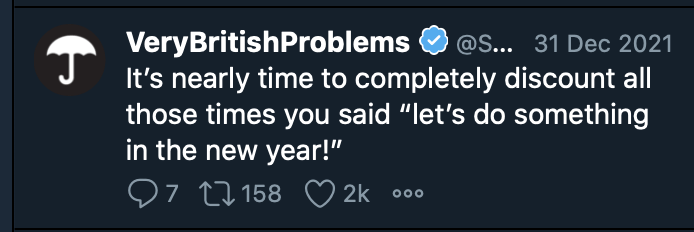Back in 2019, I noted that while Americans use the expressions “ring in the new year” or “bring in the new year,” they’re not like to use stand-alone “in the new year” as much as the British do. I was reminded of it by a tweet from @verybritishproblems:

My sense is that Americans would be unlikely to utter the quote in the tweet. Rather, they’d more commonly say “let’s do something next year” (if it’s before January 1) or “let’s do something this year” (if it’s after). They might even name the year. That is, where a British headline would say, “Stocks expected to rise in the new year,” the American counterpart might be, “Stocks expected to rise in 2022.”
To get a better sense of whether Americans are using the phrase more, I looked at the Corpus of Contemporary American English (COCA), which has a database of U.S. sources from 1990 to 2019. It shows that the use of the phrase more or less doubled from the 1990s to the 2010s. (The actual increase is probably more than that, since “bring in…” and “ring in” formulations are included and were presumably constant over that time.)

Here are some examples from COCA of uses in American sources in 2019:

Note that six of the eleven use the long-established “ring in.”
FInally, I wish all NOOBs readers happiness and especially health in the new year.


Emphasis
I have heard Americans saying ‘Happy NEW year’ but have never heard a Brit say it. Brits would tend to say ‘Happy new YEAR’.
Adding ‘s’
I have heard Americans saying ‘What are you doing for new years?’
Is that a reference specifically to the night of 31st Dec or day of 1st Jan or is it more far-reaching?
Do either of these usages relate to an American speaker’s social class?
Nick, I believe “What are you doing for New Year’s?” refers to New Year’s eve. But the interesting thing is that the apostrophe form has spread–so that people commonly say “Happy New Year’s” instead of “Happy New Year’s.” It doesn’t relate to class as we don’t have class here, but it does relate to age–the “new year’s” form skews younger.
“we don’t have class here” can be read a couple of ways 😂
I don’t find the evidence entirely convincing. Without further study, it’s quite possible to assert that Americans just started saying “ring in the New Year” more frequently after 2009 and haven’t adopted the BrE phrase. None of the provided examples sounds as foreign to my ear as “let’s do something in the New Year.”
HNY. “In the new year” is very common here in New Zealand too.
Been meaning to ask, by the way: is “puffer jacket” a NOOB? It’s hard to trace on Ngrams, since the term is still relatively new, but there does seem to be an uptick in American usage post-2000 on there. I’ve also noticed several journalists using it recently; it first stood out to me in an Atlantic piece where (American) Marina Koren said Jeff Bezos was wearing a “puffer jacket” to one of his space things. I believe the usual American term is “down jacket”?
Thanks for the question/suggestion, Key. The short answer appears to be yes, but there are some interesting nuances that I’ll explore in a post on the subject–stay tuned.
Not all down jackets are puffer jackets (pufferdom requires channel stitching) and not all puffers are down (some have synthetic fill).
As for when and whence “puffer“ in the U.S.: good questions!
What’s channel stitching? (Or should I just google it.) And do you have thoughts on the Puffa brand of puffer?
Was George Constanza’s puffy jacket the same thing as a puffer jacket?
In my (British) English “in the New Year” is much more precise than “next year” – it means “once normal life resumes after the Christmas/New Year holiday”. You’d never use it about, say, where you’re going on holiday next June.
The main thing is to have a: Happy New Year, one and all!